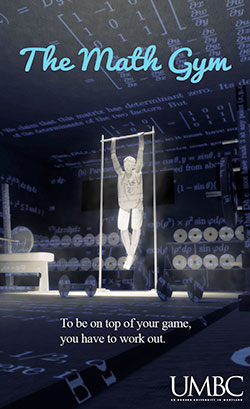Pumping Up Their Math Muscles
Coach Sory Kante, moves quickly across the gym. One of his students working out needs help. But whats stumped the student isnt a 220 pound bench press or a complicated yoga move. Its a calculus problem.
Kante is a coach in UMBCs newest type of gym: The Math Gym. One recent evening, dozens of students lined up for the gym, knowing that rather than hitting the treadmill, theyd be tackling a regimen of worksheets and quizzes specifically designed for them. The gym provides students with training in foundational skills, skills theyve supposedly already learned, but have now faded into distant memory. And, on this particular night, more than 40 students, working with as many as 7 coaches, spill out of the seminar room and into the corridors of the math department.
Math Gym is the first of the projects funded by the inaugural Hrabowski Fund for Innovation grants to get off the ground. The fund invests in creative faculty initiatives that reimagine our students learning experiences.
Nagaraj Neerchal, professor and chairman of the department of mathematics and statistics, came up with the idea for Math Gym. Its something Freeman Hrabowski inspired, he says.
Math Gym is a departure from traditional tutoring in focusing on crucial, yet basic skillsrather than a specific topic thats stumping a student in a current class. Tutoring is like going to the clinic when youre sick, says Neerchal. Working in Math Gym is like working out to stay fit so you wont get sick. We need both.
The custom workout begins with QuizZero, a quiz Neerchal and his colleagues designed to test students understanding of prerequisite material before classes start. Its administered through Blackboard and evaluates students preparation in the foundational classes, such as algebra, pre-calculus, calculus I and calculus II. Students who score below the median of the class are notified they should brush up on their skills. About 1800 students every semester take the test.
More than half of the freshman entering UMBC each year dont place into pre-calculus. Those that do may be lacking in foundational skills. Almost all of them have taken algebra in high school, says Neerchal, they just forget.
The solution, he says: come to Math Gym and get fitted for a custom workout. Last semester, nearly 800 students whose QuizZero performance indicated they could use a refresher were invited to participate. Of those, over 500 came to Math Gym.
If students are taking a class, any class, says Neerchal, and if they are unable to do well in class, its because theyve lost their foundational math skills.
Once a student completes QuizZero, they can come to the Math Gym and have their workout customized. The Math Gym coaches and manager have a spreadsheet that they can check to find out what students have to work on. They pass out worksheets and the students are ready for their workout.
As the semester progresses the gym rats develop their foundational skills and they can begin to move on to working on their current class, says Chris Harris, Math Gym manager.
And Math Gym appears to be working. This semester, I saw a dramatic increase in student exam grades in applied calculus as compared to last year of approximately twenty points, says instructor Elizabeth Stanwyck. We are tracking the progress of those students who have come to Math Gym versus those who have not, says Neerchal.
And students say that Math Gym is helping them in their classes. Take Aaron Good, a junior, majoring in physical therapy. Good is taking trigonometry and pre-calculus. I noticed that my test scores and everything significantly improved, since the opening of Math Gym, he says. Good says that he hopes to make around a B in his class.
Other gym rats, Nnamdi Onyioofor, a senior, and Caleb Zhou, a freshman, are at Math Gym one evening to work on Calculus I. Ive been here for the past week every day, Zhou says.
Professors also offer extra credit for students who regularly go to Math Gym. But Nicole Lentz, a freshman, says its not just the extra credit that keeps her coming back.
The people here are really helpful too, she says. Whenever I have a question they just sit down and help you work it through. They dont just tell you how to get it so it really makes me understand everything a lot better.
Whats next for Math Gym? Neerchal and Harris are looking to target a wider range of courses, including those in disciplines beyond mathematics and statistics. They would like to build relationships with other departments and colleges so that students could come to work on math skills relevant for their subjects, such as chemistry, physics and economics. No matter the subject, the underlying math skills are the same.
And the key to mastering them, Neerchal says, is doing reps. Its all about repetition just like at the gym.
(6/17/13)

